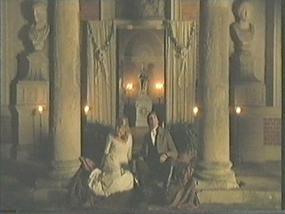A Proposal for a paper to be Delivered at a meeting of the Burney Society in Montreal 2014, prelude to JASNA AGM
What the four film adaptations have to tell us about Austen's Mansfield Park and one another

There have thus far been four film adaptations of Austen's Mansfield Park, all of them controversial, even the first, the 1983 BBC Mansfield Park, if you take into account persistent attacks on it for choice of actors for Fanny and Edmund (Sylvestre Le Tousel and Nicolas Farrell) as excruciatingly ugly and what I'd call its Chekhovian slow pace as excruciatingly dull. While the 1990 Whit Stillman independent film, Metropolitan, received awards and much praise, it has since grated on critics and viewers alike as insufferably elitist (insular), priggish, and too literary. Patricia Rozema's 1999 Mansfield Park, the usual Miramax fusion of art, heritage, and popular tropes, is still famously controversial. Lastly, of three brief (93 minutes on average) ITV Austen films made in 2007, Mansfield Park may be said to have been targeted for more unqualified ceaseless abuse, for (once again) its choice of actors for the lead characters (especially Billie Piper), script (though to be fair, Maggie Wadey's similarly free 1987 Northanger Abbey has been much castigated), and pace (this time the film moves too fast).
I will first provide a non-impressionistic concrete study of these four films as they mirror specific features of Austen's Mansfield Park to show how they thoughtfully transfer Austen's uses of drama and theater, epistolarity techniques, and literary and socially-critical allusions to filmic art conventions. I will then look at the films intertextually, in the light of one another and some specific films or texts outside Mansfield Park they use, to suggest they show an intensification of contemporary responsiveness to Austen as each builds on, reacts against, and/or extends insights into the novel of previous films. I hope to offer a way of understanding the nature of Austen's text and themes that the wider public feels ambivalent about through a use of film adaptation that examines different kinds of relations between the successive films and the novel and the cultural and entertainment work they all perform. Ellen Moody
Home
Contact Ellen Moody.
Pagemaster: he has died, is no more
Page Last Updated 14 February 2014